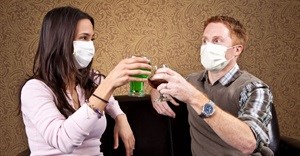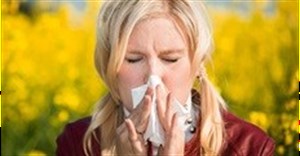
Subscribe & Follow
Bites, stings can have serious consequences

"Mosquito, spider, tick and flea bites, as well as bee, wasp and bluebottle stings, are more common during summer but are usually not a threat to our health, generally only causing localised itching, pain, mild swelling and redness that disappears within a few hours or, at worst, within a day or two. However, bites and stings in some cases can be serious, particularly in individuals who are allergic. We should take care to avoid stings and know how to treat them appropriately when they do occur."
Mosquitoes and ticks can carry illnesses such as malaria and tick bite fever. However, an estimated 3% of the population is also highly sensitive to certain insect and spider venoms and can develop severe reactions to them. Children and the elderly are particularly at risk of developing complications from certain stings and bites and should be especially wary.
"If you get stung or bitten, wash the affected area with soap and water and then apply an antihistamine ointment or light cortisone cream. You can also take an oral antihistamine. Ticks and bee stings should be removed before the affected area is cleaned. Use a knife, a credit card or your fingernail scrape out a bee sting to gently. Try to avoid squeezing the stinger as you may cause it to inject further venom into your skin. Ticks should be removed with tweezers. Try to grip the tick's head and pull it straight back trying to avoid leaving any part of the tick embedded on the skin."
Bee allergies
"People who are allergic to bee stings need to take particular care because even one sting can be dangerous, causing a life-threatening allergic reaction and anaphylactic shock. Consequently, they should wear a medical bracelet and carry an adrenalin injection with them at all times as per the advice of a medical doctor. Antihistamine pills should also be kept to hand. Always watch out for reactions to bee stings because you can become allergic to them at any time of your life, even if you have never been allergic before.
"If you show signs of having a severe reaction to a bite or sting get to a doctor or hospital emergency department as soon as possible. Indications that you are having an allergic reaction could include difficulty in breathing or swallowing; choking or wheezing; pain in the abdomen and/or chest, nausea and vomiting; feeling faint; severe headache and general or localised skin changes such as a rash or itching.
Snakes, scorpions, spiders
South Africa has many different snake, spider and scorpion species. Many of them are not venomous and the symptoms following a bite or sting can vary considerably. If you were not sure what has bitten or stung you, you would be well advised to visit your nearest emergency department. Try to remember as many details as possible as it may help medical personnel to identify the type of snake, spider or scorpion, so that you can receive the appropriate treatment. If possible, try to take a picture of the creature that has bitten you, using your cellphone camera.
Snakebite can cause mild or severe symptoms that include swelling or discolouration of the skin in the bite area, a racing pulse, weakness, shortness of breath, nausea and vomiting. In extreme cases, it may also lead to shock, convulsions and severe pain and swelling. Never use a tourniquet with snakebite and always keep the bitten area lower than the patient's heart. Do not cut the wound or allow someone to try to suck the venom out as this could lead to infection.
Scorpion stings are rarely fatal in South Africa, but they can be extremely painful, causing sweating, heart palpitations, rising blood pressure, nausea, vomiting and diarrhoea.
The three medically important spiders in South Africa are the black button spider, the violin spider and the sac spider. The Black Button Spider, which has a neurotoxic venom is considered the most dangerous - generally the smaller the victim the more serious the impact of its venom. The bite can cause pain, cramps and severe anxiety but it does usually respond well to timely, appropriate medical treatment.
Bluebottles and jellyfish
Those who enjoy the sea may need reminding that the ocean is full of its own creepy crawlies, some of which also bite and sting. Every year many South Africans are stung by bluebottles, and less commonly by jellyfish. Little children find the sting of a bluebottle particularly distressing. If you are stung by a bluebottle or jellyfish, do not rub the affected area but rather rinse it with seawater. Alleviate the burn by applying vinegar or alcohol to the sting and treat the area with topical antihistamine creams or calamine lotion.
As with other bites and stings, seek medical attention immediately if the person develops muscle spasms, has difficulty breathing or develops an infection. To avoid being stung by jellyfish or blue bottles, watch for them when you walk on the beach or swim in the sea.
Repelling insects
"The best way to avoid being bitten or stung is to be cautious. Insect repellents coils, candles, sprays and creams that contain N-Diethyl-meta-toluamide (DEET) are known to be highly effective. DEET-based skin repellent keeps mosquitoes and other insects at bay for 300 minutes, while citronella repellent needs to be reapplied every 20 minutes. Sleeping under a mosquito net can also help to ensure you keep insects and other unsavoury creatures at bay while sleeping.
"Flower fragrances and bright colours attract some insects, so avoid wearing perfumes and wear lighter colours, particularly white. In addition, when hiking or walking in long grass, wear closed shoes with long trousers that can be tucked into long socks or boots. For added protection, spray fabric insecticides, such as Permethrin, onto your clothing. This is particularly useful in preventing insect bites at night.
"Find out whether scorpions, spiders or snakes are common in the area that you will be visiting. Some creepy crawlies can find their way into your shoes so be sure to shake them out before putting on your footwear. Stay on paths and trails when walking in the bush or through the veld.
"Large numbers of people are bitten and stung every year because they are overly inquisitive. If you spot creatures such as snakes or scorpions, give them a wide birth and leave them in peace," concludes Dr Vincent.












